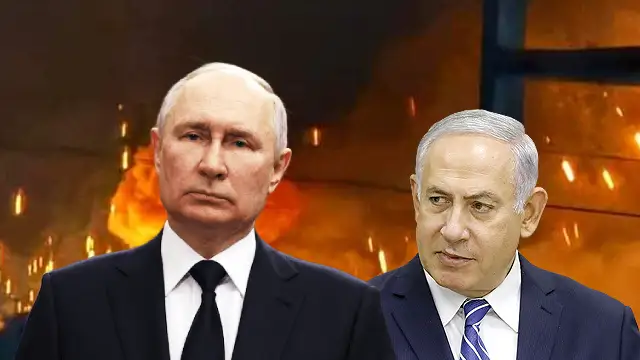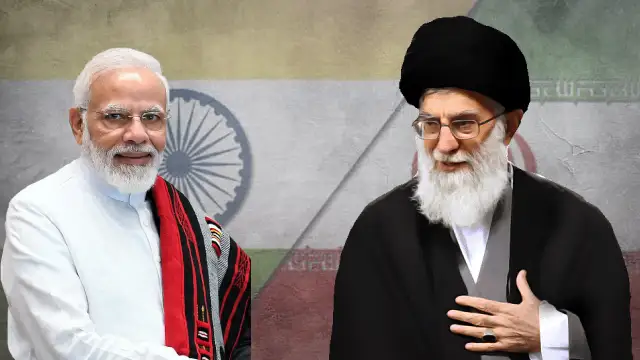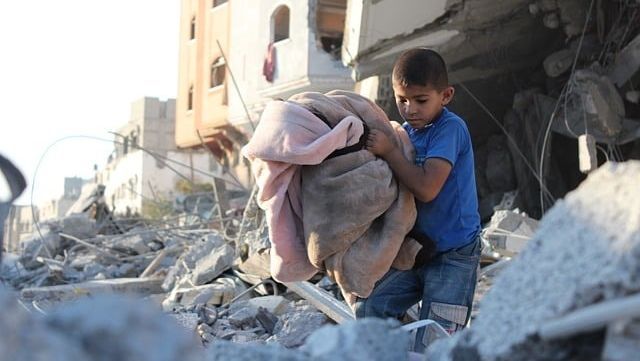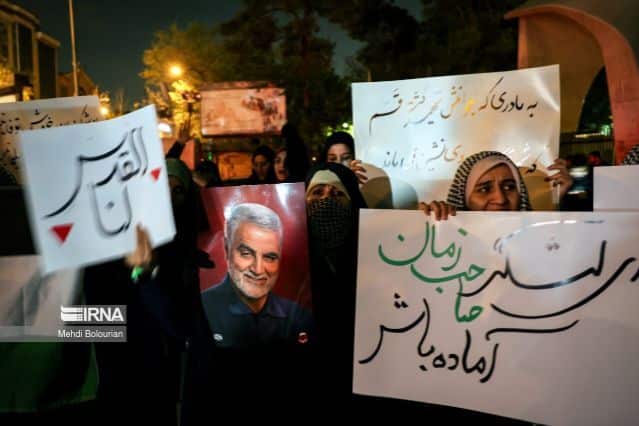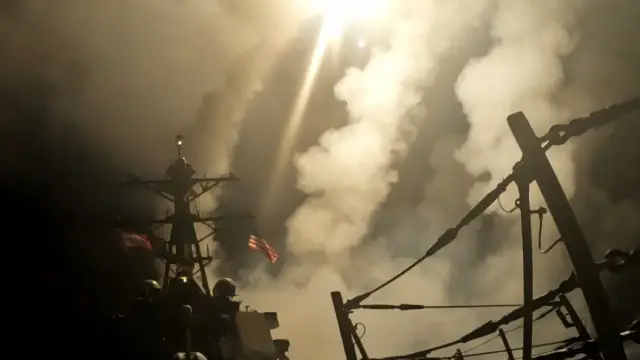Speculations have been rife on social media platform X (formerly Twitter) that Russian President Vladimir Putin may be planning an action against Israel and that’s why Russia has asked its citizens in Israel, including dual citizens, to return to their home country. Influencers and alternative media platforms, including the Mint Press News, have also shared this speculation on social media. Questions arise on whether there would be a Russian attack on Israel.
The source of the speculation is a piece of news that has been widely published by western mainstream media, as well as China’s Xinhua, which claims Israeli airstrikes in Syria have hit a weapons depot inside a Russian air base.
According to reports, the Israeli airstrikes have hit a weapons depot, which reportedly stored weapons and ammunitions for Iran and the regional resistance organisations, in the Syrian city of Jableh in the governorate of Latakia.
While some claim that the target was inside Russia’s largest air base in Syria—Hmeimim Air Base—others claim it was close to the air base and both Russian and Syrian forces responded to the attack.
Huge flames were visible from afar and firefighters had to struggle to bring the fire under control, reports claim.
This attack, which happened near the Hmeimim Air Base, has been highlighted as one that has led Mr Putin to order an evacuation of Russian citizens from Israel and led to the rise of speculations over a possible Russian attack on Israel.
However, what remains unanswered is whether anything of this level has taken place that would demand an imminent Russian attack on Israel or even Moscow’s direct entry into the West Asian theatre.
Israeli attack on Russian air base: What do facts say?
The reports published in the western mainstream media, like Britain’s The Telegraph, the US’s New York Post, Ukrainian media, Israel’s Times of Israel and China’s Xinhua, highlight that an Israeli airstrike in the Syrian city of Jableh in the early hours of Thursday, October 3rd, has targeted a weapons depot that is located close to the Hmeimim Air Base.
It has been claimed that the Russian and Syrian air defence systems intercepted dozens of Israeli missiles fired at the target, yet failed to save it.
While the narrative of the West focuses on Israel hitting outside the Hmeimim Air Base, other outlets, like India’s far-right disinformation handle Times Algebra, Ukraine’s Kyiv Post, etc, have claimed that Russia has hit the Hmeimim Air Base, which can be considered as its attack on Russia itself.
Surprisingly, the Russian media outlets, including TASS, have maintained silence on the attack near the Hmeimim Air Base and so did the Syrian media. The Syrians have acknowledged attacks but didn’t disclose whether they hit a weapons depot or some other targets.
The Syrian Arab News Agency (SANA) has remained silent on the weapon depot being hit.
While the Russian media and SANA have not mentioned any incident related to the Hmeimim Air Base, where are the western outlets and disinformation sites sourcing their information from?
A questionable source
The stories have a common source, rooted in the so-called “Opposition” in Syria. This ‘conglomeration’ has been accused of being proxies of the West, Israel and several Gulf monarchies that waged war against Syria in 2011 using terrorists.
Most of the reports are based on the claims of the Syrian Observatory for Human Rights (SOHR), a UK-based organisation accused of promoting the ISIS-led terrorist aggression in Syria, which the coalition of the Syrian Arab Army (SAA), the Russian Air Force and Hezbollah defeated through an arduous struggle.
The SOHR is also linked with the Jihadist White Helmet organisation accused of promoting fake narratives around Syria.
“Unknown drones … carried out airstrikes targeting an ammunition warehouse near Jablah city in Latakia countryside, near the largest Russian air base in Syria, which led to the warehouse’s destruction and huge explosions heard from far away,” the SOHR reported.
Not just the West’s mainstream media, but even China’s Xinhua and independent media outlet The Cradle also cited SOHR sources for their stories.
One of the main accounts on social media that has shared the story of an Israeli airstrike targeting the weapons depot near the Hmeimim Air Base belongs to Abdullah Almousa, who is a supporter of the Syrian ‘Opposition’ and peddles pro-western, anti-Syrian narratives.
As one of the significant accounts in Syria followed by the West, Mr Almousa posted about the attack first on social media platform X (formerly Twitter).
Earlier Mr Almousa had downplayed the Iranian missile strikes on Israel, calling them ineffective.
Based on Mr Almousa’s tweet, speculations became rife over an imminent Russian attack on Israel.
But are the claims regarding the possibilities of a Russian attack on Israel?
Russia in West Asia
The Russian Ministry of Foreign Affairs has kept no qualms in condemning Israel’s attacks on Gaza and Lebanon. Russia has strongly condemned the killing of Sayyed Hassan Nasrallah, the former secretary general of Hezbollah, and it has asked Israel to de-escalate tension and go for a ceasefire.
Russia’s long-term strategic interests in West Asia depend on the sustenance of its partners like Iran and Syria, and weaning away American allies like Saudi Arabia and the UAE.
These monarchies have already shown shifting signs and have strengthened their ties with Russia despite the US’s warnings, exemplifying changing geopolitical realities.
Despite these, Russia has strong ties with Israel.
The Russian Jews form a significant part of the population of Israel.
Despite their differences, Israeli Prime Minister Benjamin Netanyahu has avoided confrontation with Mr Putin.
However, the recent developments in West Asia have affected the bilateral relationship, according to Russian Ambassador to Israel Anatoly Viktorov.
Moscow’s allies like Iran and Syria are always on Israeli radars. Syria continues to face regular attacks from Israel, which violates its sovereignty.
The absence of a strong air force and air defence system makes Syria, battered by over a decade-long civil war, vulnerable to Israel’s precision strikes.
While Israel earlier used to warn Moscow of its strikes, it’s reported that following Russia’s increasing opposition to the genocidal attacks on Gaza, Tel Aviv has stopped warning it.
The attack on Jableh could be one in which the Russians were caught unaware.
But does that mean there is a possibility of a Russian attack on Israel?
Russian attack on Israel
The warning that Mr Putin’s government allegedly issued isn’t available on the Russian Ministry of Foreign Affairs website or the Kremlin’s website.
Their social media handles have been busy promoting Russian Foreign Minister Sergey Lavrov’s speech at the United Nations General Assembly, his meeting with different delegates and his emphasis on China-Russia relations in the context of the 75th anniversary of the founding of the People’s Republic of China under the Communist Party of China.
There have been no orders issued to Russian citizens separately, although dual citizens of many countries have been frantically leaving Israel since Iran launched its counter-strike on October 1st night.
Visuals from Tel Aviv Airport show long queues of passengers hurrying to reach their homes.
In this situation, the talks of a Russian attack on Israel appear to be driven by mere speculations than facts.
For the last 31 months, Russia has been engaged in its special military operations in Ukraine, where it’s facing a collective attack by the North Atlantic Treaty Organization (NATO) countries.
The attacks are taking place under the aegis of the US, with Ukraine being its pawn.
While Russia is testing the prowess of NATO’s advanced weapons and drawing American money and resources in the prolonged conflict, it can’t open a new front in West Asia, directly, to draw the US into a confrontation.
A Russian attack on Israel will provide the US with an opportunity to launch a war against Russia and that won’t remain a local conflict, a West Asian conflict, but a full-scale world war.
This is something both China and Russia have been avoiding while they are extending their support to the resistance in one way or another.
Can this entire hullabaloo over an imminent Russian attack on Israel be new propaganda by the West-backed Syrian terrorists to stir trouble in the murky situation?
The Syrian terrorists have suffered immensely due to Russia’s participation in the war at the request of President Bashar al-Assad and they have been trying to avenge the humiliation.
Isn’t it easy to stir troubles for Russia, the common enemy of the Syrian terrorists and the collective West, amid the wave of violence?
However, for those on the side of Palestinian and Lebanese people, to get swayed by the narrative and to believe that there can be a Russian attack on Israel is quite unwarranted.
It only shows the depth and convincing narrative that the disinformation campaigns can create.
Can those on the progressive side of history eat the bait?

